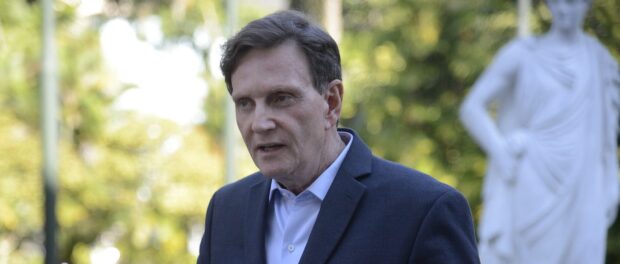
For the original article in Portuguese by Michel Silva published on Fala Roça click here.
RioOnWatch Editor’s note: On Sunday, September 17, shootouts between drug traffickers broke out in Rocinha, initiating a week of police operations before Armed Forces were sent to occupy the community on Friday, September 22, with further shootouts involving traffickers and soldiers. Many Rocinha residents were stranded in their homes with businesses, health centers, and schools shut for days, while the conflict dominated Brazilian media and drew international headlines. For English-language coverage that contextualizes these events in the broader failures of Rio’s public security policies, we recommend the news report in The Guardian and analysis in The Intercept.
Last Sunday, September 24, Rio Mayor Marcelo Crivella went on the community radio program, Brisa, in the Rocinha favela. In the midst of the tense climate due to the armed conflicts that occurred the previous Sunday (September 17) and the intervention of armed forces in the favela, the mayor received residents and responded to various questions on topics related to Rocinha.
With regards to the controversy regarding the expropriation of the Clube Emoções event venue on the side of Estrada da Gávea, resident and Rádio Brisa presenter, Elias Lira, asked if the affordable housing construction project [that will replace the venue] will be implemented. Mayor Crivella replied that “the club will be relocated. It won’t close but it will be relocated to a nice, well-suited area with good acoustics. There is a great need for affordable housing here in Rocinha, many people in Rocinha are living in very bad conditions. It is good to remember that in Rocinha there is still a high level of tuberculosis because there are people living in areas the sun doesn’t reach. The humidity in those alleys is tremendous.”
The buildings will be built on a plot of land situated one kilometer from the São Conrado beach and 100 meters from the [São Conrado] metro station. The apartments will be around 60 to 70m2 with elevators and shops on the ground floor. The land value will not be incorporated in the final price tag of the construction project. One apartment might cost up to R$100,000 with government subsidies. According to the Rio de Janeiro Housing Syndicate (SECOVIRIO), an apartment of 60m2 in São Conrado typically costs around R$720,000.
Deficient Culture
Cultural organizer Tio Li coordinates a cultural project in Cachopa, next to Campinho. He lamented the lack of playground equipment in the neighborhood’s squares and called for the upgrading of these squares. According to the Municipal Secretary of Conservation and the Environment, Rubens Teixeira, he will request support from the Parks and Gardens Foundation and from COMLURB to visit and identify the problems of these leisure areas in Rocinha.
The regional administrator of Rocinha, Rommel Cardozo, cited the abandonment of Rocinha’s Ecological Park and Park Library, which cost the public R$31 million. “The Ecological Park is an abandoned paradise in Rocinha. It has an area for barbecues, it is a marvelous place, and the families of Rocinha could embrace this space,” Rommel said, suggesting the City take responsibility for these spaces.
Federal Assistance
Crivella travels to Brasília this week and will participate in the Ministry of Social Development’s launch event for a package of social actions that will be implemented in Rio’s favelas with federal government resources. The mayor stated he would take up the issue of the Park Library in a meeting with Minister Osmar Terra, since the reopening of this space is “a debt of the federal government to all of us.”
Since becoming mayor in early January, Crivella has made sporadic visits to Rocinha. With the federal intervention of armed forces in the area, he aims to take advantage of the moment to carry out projects to promote public order with the help of the secretariat. “Rocinha is calm, it does not have a problem. Now is the moment for us to come up the hill [into the favela]. To convince our social workers, the masons, the carpenters, the electricians, the firemen, everyone, because this is the moment we have to make changes, repairs, and improve everything,” said Crivella.
